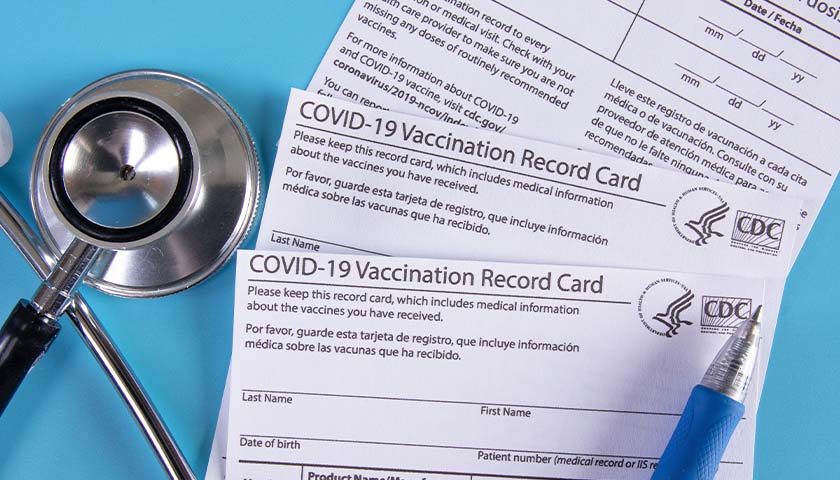by Bethany Blankley
While much attention has been focused on the fallout of increased illegal immigration and crime at the southern border, Customs and Border Patrol agents also say they are routinely finding packages shipped from China containing fake COVID-19 vaccination cards.
CBP says its agents have seized more than 6,000 counterfeit COVID-19 vaccination cards in Chicago, Memphis, Anchorage and Pittsburgh in the past few months.
At the International Mail Facility at Chicago O’Hare Airport, agents last week seized two shipments of counterfeit COVID-19 vaccination cards originating from China headed to Texas.
One package was manifested that it contained PVC sleeves; another was labeled as containing greeting cards. The counterfeit cards closely resembled Center for Disease Control certificates, the agents found, but appeared to be fraudulent due to their low-quality appearance and other discrepancies.
“Our CBP officers continue the fight against these crooks who are using this pandemic to make a profit by selling these fraudulent documents,” LaFonda Sutton-Burke, director of Field Operations in Chicago, said in a statement.
This was the third time Chicago CBP has stopped shipments of counterfeit COVID-19 vaccination cards in less than two months.
Last month, agents at the Port of Cincinnati confiscated their fifth shipment of fake vaccine cards. Since August 16, Cincinnati agents have seized 1,683 counterfeit COVID-19 vaccination cards and 2,034 fake Pfizer inoculation stickers.
Although the vaccination cards displayed a CDC logo, CBP agents noticed misspellings and substandard printing, clues that they were fake.
All of the shipments originated in China. They were imported by non-medical entities in private residences and apartments located in Illinois, Maryland, Missouri, New York and Texas, CBP states.
“Creating or buying a fake COVID-19 vaccination card is illegal, not to mention dangerous,” Cincinnati Port Director Richard Gillespie said in a statement. “Purchasing counterfeit cards supports criminals whose only concern is their bank account, not American security or the health of our citizens. Our officers know that counterfeiters will try to replicate anything to benefit themselves, with no thought to the innocent victims that may suffer from their actions. The men and women of CBP are trained and ready to shut down these scammers and protect our country.”
CBP’s border security mission at ports of entry is to “screen international travelers and cargo and search for illicit narcotics, unreported currency, weapons, counterfeit consumer goods, prohibited agriculture, and other illicit products that could potentially harm the American public, U.S. businesses,” and undermine national security.
Part of this involves CBP’s Fraudulent Document Analysis Unit working with U.S. Department of Homeland Security Investigations and other federal agencies to interdict fraudulent documents and illicit activity.
The U.S. Department of Health and Human Services Office of Inspector General also is warning Americans about COVID-related fraud.
“Be cautious of COVID-19 survey scams,” it states. “Do not give your personal, medical, or financial information to anyone claiming to offer money or gifts in exchange for your participation in a COVID-19 vaccine survey.”
It also says that photos of COVID-19 vaccination cards “should not be shared on social media,” including personally identifiable information that could be used for identity theft purposes. “Beneficiaries should be cautious of unsolicited requests for their personal, medical, and financial information,” it adds.
“Be aware of scammers pretending to be COVID-19 contact tracers,” the warning states.
“Legitimate contact tracers will never ask for your Medicare number, financial information, or attempt to set up a COVID-19 test for you and collect payment information for the test.”
Suspected COVID-19-related fraud can be reported online or through a tollfree number: 800-HHS-TIPS (800-447-8477).
– – –
Bethany Blankley is a contributor to The Center Square.
Photo “COVID Vaccination Card” by Jernej Furman CC BY 2.0.




